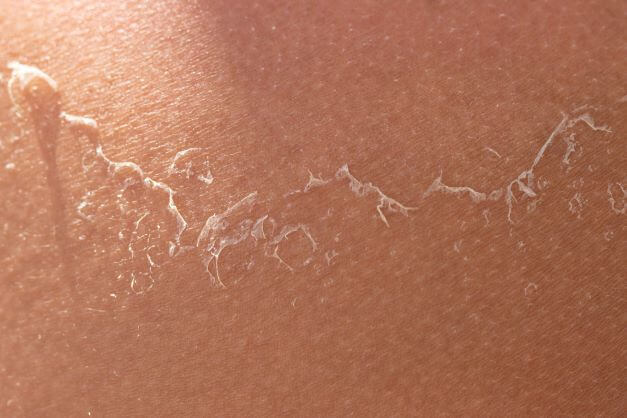Dry, flaky, peeling skin doesn’t feel great, and it can look even worse. If you’re dealing with peeling skin, Dr. Taylor Dickerson of U.S. Dermatology Partners in Tyler, Texas, says, “The good news about peeling skin is that it’s not often a warning sign of anything serious. In many cases, skin peeling is a response to chronic skin disorders, a mild side effect of a medication, or a symptom related to allergies or other adverse responses. Typically, skin peeling can be addressed with mild, over-the-counter products. In rare cases, skin peeling can be a sign of something more serious, so it’s important to consult with a dermatologist to pinpoint the underlying causes of skin peeling. This allows your dermatologist to recommend the best treatment options to renew your skin’s health and appearance.” Keep reading to hear more about common causes of skin peeling from Dr. Dickerson.
Reason 1 – Allergic Response
When it comes to common causes of skin peeling, Dr. Dickerson says, “Allergic reactions to products that directly touch the skin like environmental irritants, metals, skincare products, cleansers, and other elements are possibly the most common causes of skin peeling. Allergic response to foods and medications as well as seasonal allergies can also lead to skin peeling.”
Reason 2 – Infections
Infection is another common cause of peeling skin. Any type of infection can lead to skin peeling, but it’s most often a symptom of skin infections caused by staphylococcus (staph infections). Skin peeling is also linked to fungal skin infections like athlete’s foot, jock itch, and ringworm. Systemic infections like scarlet fever may also lead to skin peeling.
Reason 3 – Immune Disorders
Immune disorders can lead to skin peeling. Specifically, this occurs as a symptom of Pemphigus, an autoimmune disorder that causes the body to attack cells in the outer layers of the skin.
Reason 4 – Idiopathic Disorders
Several idiopathic disorders can lead to skin peeling. Kawasaki disease, a condition that most often impacts children under the age of five, causes rashes and peeling skin. Additionally, acral peeling skin syndrome, a rare skin disorder, causes the outer layers of the skin to peel. This peeling is painless, but it can negatively impact the appearance of the skin and cause itching and irritation that adversely affects the look and feel of the skin.
Reason 5 – Cancer & Treatments for Cancer
According to Dr. Dickerson, “Cancer, specifically Non-Hodgkin Lymphoma, and cancer treatments are often linked to skin conditions, including skin peeling. As part of your comprehensive cancer treatment plan, you should consult with a dermatologist to keep skin healthy and address symptoms as soon as they arise.”
Reason 6 – Chronic Skin Conditions
Many chronic skin conditions cause skin thickening, flaking, and peeling. Specifically, those who struggle with skin conditions like eczema (atopic dermatitis), contact dermatitis, seborrheic dermatitis, psoriasis, rosacea, and acne-prone skin are likely to experience skin peeling. Managing all symptoms of chronic skin conditions, including skin peeling, and taking steps to prevent flare-ups in these skin conditions is essential.
Reason 7 – Skin Type
When it comes to skin types prone to skin peeling, Dr. Dickerson says, “Those with dry, acne-prone, or sensitive skin are much more likely to experience skin peeling. This can be especially true when using new skincare products, so make sure to consult with a dermatologist before making changes to your routine. For dry skin, pay attention and adjust your skincare routine during the fall and winter months when skin tends toward dryness.”
Reason 8 – Medication Side Effects
Certain medications have skin health side effects, including peeling. In most cases, peeling skin is a mild symptom that will clear up on its own after you complete medication use. If you are going to be using a medication for the long term, you may need to talk to your doctor about different treatment options and work with a dermatologist to address side effects until your skin heals. There is a more severe skin peeling condition that can arise as a symptom of certain medications. According to Dr. Dickerson, “While skin peeling related to medications typically clears up and causes minimal adverse effect to skin health, there is a rare condition called Stevens-Johnson Syndrome that may also occur when taking some medication. This adverse drug reaction starts with symptoms common to the flu, including fever and chills. From there, there is redness and blistering of the skin, which leads to skin peeling. If you believe you’re suffering from Stevens-Johnson Syndrome, you should seek emergency medical attention immediately.”
Reason 9 – Burns & Sunburn
Two of the most common causes of skin peeling are burns and sunburns. After the skin is burned by heat, chemicals, or the sun, it reddens, blisters, and peels. Following a burn, keep skin moisturized with deep-hydrating products like aloe vera to promote faster, more comfortable healing. As the skin peels, avoid the urge to scratch or scrub. Instead, gently wash the skin and use soft cleansing cloths to remove peeling skin without causing irritation or wounds that increase the risk of infection. Additionally, protect the skin from further sun damage with sunscreen. ALASTIN Skincare Silkshield All Mineral Sunscreen SPF 30 with TriHex Technology offers optimal protection against sun damage while also hydrating and healing burned skin.
Reason 10 – Using Certain Skincare Products & Treatments
According to Dr. Dickerson, “It’s important to choose your skincare products carefully. Products that contain drying ingredients like alcohol, retinols, exfoliants, and acids can all irritate the skin, leading to peeling. You can minimize the risk of peeling skin by spot-testing any new skincare products. Apply the product to the skin in a small area. Then, wait for a few days to a week. Observe any changes in skin health. If you notice irritation or peeling, discontinue use of this product.” To minimize the risk of peeling skin, you can also consult with a dermatologist before adding any new skincare products to your daily routine.
Consult Your Dermatologist
If your skin is peeling and you need additional support addressing this symptom, you want to talk about updating your skincare routine, or you’re interested in a dermatologic procedure, the U.S. Dermatology Partners team is here to support your skin health goals. Getting started is quick and easy, simply take a few moments to fill out our online scheduling form. Then, a dermatology team member will call to finalize the details of your visit.
Find a location near me
or


